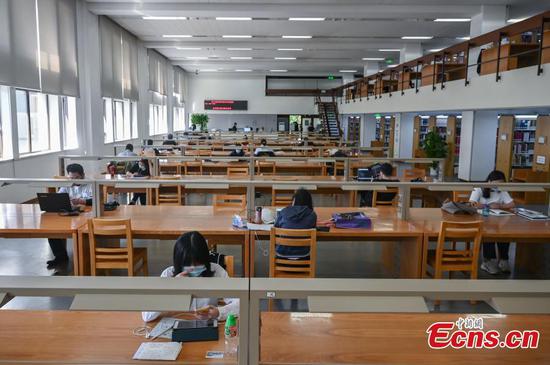Domestic violence is rising across the United States amid the COVID-19 pandemic, and experts warn that there will be a surge in such abuse when stay-at-home orders are lifted.
Stay-at-home orders to prevent the spread of the coronavirus might be dangerous for victims and survivors to quarantine with their abusers, say victim advocates.
Since the outbreak of COVID-19, reports of violence against women, and particularly domestic violence, have increased in the U.S. and several countries, according to the report "COVID-19 and Violence against Women and Girls" by UN Women.
The report says the increase in violence is tied to the pandemic as "security, health, and money worries create tensions and strains accentuated by the cramped and confined living conditions".
Though most states are now lifting or easing stay-at-home orders, 90 percent of U.S. residents lived under them for almost two months. Across the U.S., some cities have seen an increase in domestic abuse reports and calls to domestic violence hot lines in recent weeks.
More than 5,000 people have called the National Domestic Violence Hotline since mid-March and cited COVID-19.
In Portland, Oregon, police arrested 38 people for domestic violence from March 12- 23, compared with 30 arrests in the same time period in 2019, an increase of 27 percent.
Boston saw a 22 percent increase in simple assault and battery reports of domestic violence in March. Police department statistics show there were 203 reports compared with 166 in March 2019.
From March 27 to April 2, as the majority of states ordered the public to stay home, there were at least 19 domestic violence-related murder-suicides (including four attempted ones), compared with an average of 11 murder-suicides per week, according to a HuffPost analysis last month.
Ohio has seen a 34 percent increase in domestic violence homicides between February and April this year, compared with the same period last year, according to the Ohio Domestic Violence Network's domestic violence fatality data. Columbus police confirmed a 20 percent increase in domestic violence calls in March.
In Dayton, Ohio, a 32-year-old woman died after being shot multiple times last week. Police arrested a 33-year-old man and said the shooting was likely related to domestic violence.
Last month, a Pennsylvania man upset over losing his job due to the pandemic shot his girlfriend and then killed himself in an attempted murder-suicide.
In King County, Washington, where Seattle is located, there has been a 20 percent increase in domestic-violence felony cases, including murder charges against a man accused of strangling the mother of his two children just months after he got out of prison. He had attacked her in 2013.
"The number and the intensity of the cases have escalated," David Martin, chief of the domestic-violence unit in the prosecutor's office in King County, told The Wall Street Journal.
Some cities have seen a decline in domestic violence, including San Francisco, Dayton, Chicago and New York, but advocates said it's even more worrisome because it's harder for victims to get help during the pandemic, or they fear moving into a shelter might expose them to the virus.
In San Francisco, District Attorney Chesa Boudin told the Journal that he fears that attacks aren't being reported. The city, known for its high housing costs, has secured 20 furnished apartments so that victims trapped with abusers during the lockdowns can move to a safe place, he said.
The National Domestic Violence Hotline group has been receiving an increasing number of calls from survivors who say the pandemic is making their situation worse, the group's CEO, Katie Ray-Jones, told CNN.
"One woman was audibly hoarse and said her partner had tried to strangle her, but she was too scared of the virus to go to the hospital," said Ray-Jones.
Economic hardship caused by increases in unemployment also plays a role in the surging domestic violence. So far, more than 36 million Americans have filed for unemployment benefits in the past two months due to the pandemic.
A survey by the Federal Reserve found that in households making less than $40,000 a year, nearly 40 percent of those who were working in February lost their jobs in March or the beginning of April.
A study by the National Center for Biotechnology Information on the Great Recession reveals that economic hardship, uncertainty and unemployment during recessions increase risk of intimate-partner violence and controlling behaviors among men.
"This pandemic is novel in its breadth and response, but we can look to regional responses to natural disasters elsewhere in the country and around the world to anticipate needs," wrote Mary O'Doherty, executive director of the Ohio Domestic Violence Network, in a column in The Columbus Dispatch on May 9.


















































